Swim England Apologises After Another Damning Report Urges Cultural Overhaul As Members Express Lack Of Trust
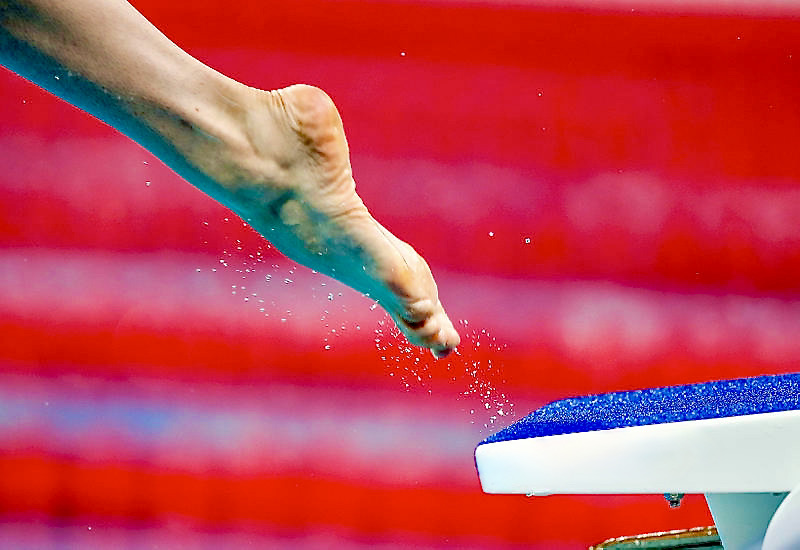
An independent report into Swim England culture has recommended a major overhaul of failing governance after a high percentage of members taking part in a mass listening exercise expressed a lack of trust in the aquatics regulator.
Following on the heels of the Weston Review, the Report of key findings from the Heart of Aquatics Listening Research, penned by The Behavioural Architects (TBA) and commissioned by Swim England, reads in places like a red flag to prospective parents looking for a healthy sports environment to introduce their children to.
If ‘safeguarding’ conjures up a list of behaviours and practices in elite sport that have been raised against coaches, it would be a big mistake to conclude that such things alone tell the woeful tale of life at Swim England in the past few years: the TBA report places all of that in the prime context of failings it highlights in the regulatory regime.
Some members have called on the Board of Swim England to resign, just a week after the association’s long-time CEO Jane Nickerson retired from the role a year after heavy criticism in the Weston review.
That independent report lambasted Swim England, supported some of those who had criticised the authority for exercising a lack of due process but under the terms of reference was not able to recommend or reversal of any previous SE decision. As such, complainants who had been penalised were not cleared and could not claim to have been cleared and all those who claimed they had suffered harm as a result of SE decisions were unable to rely on Weston in their demands for a rethink by the national regulator and the funding body it is answerable to, Sport England.
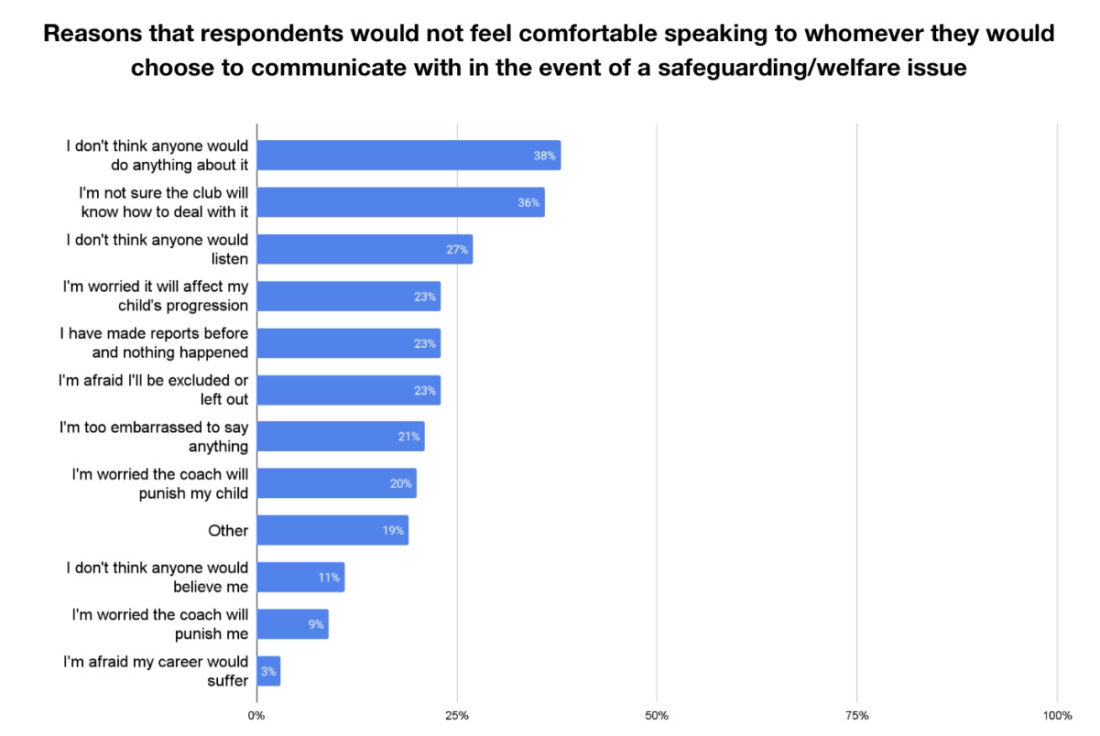
Swim England members who participated in the “Mass Listening” exercise with TBA have called for a clean slate.
– some of their views dotted throughout this article as screenshots – see the report for context:
The Behavioural Architects – Key Findings Report In Full
The TBA report notes: “Those who have had negative experiences with Swim England hope for a review and complete overhaul of those in positions of power.
“There is a desire for bringing in fresh perspectives – including people from outside of aquatics – who are not perceived to be preoccupied with ‘protecting their own’ or to have been known to ‘sweep things under the carpet.’
“It is believed this would bring confidence that Swim England is serious about cultural change, with a new outlook and agenda. These hopes predominantly relate to Swim England senior leadership and board, although there is also mention of the need for fresh perspectives at a regional level.”
It cites the following witnesses:
“A recruitment strategy that only looks within the sport has given us what we have now – a network of people that all know each other and protect each other, even when swimmers and volunteers have valid concerns about welfare matters.” – Parent, Swimming, Mass listening
“I believe water polo is on the up – some of the new coaches are a breath of fresh air – but while the rump of the old guard are still in place things cannot ‘cleanly’ move forward – management previously has been a disgrace within Swim England and in many cases still is.” – Parent, Water polo, Mass listening.
Swim England ‘Apology’
Swim England chair Richard Hookway issued an apology on behalf of the association, though the apology was soon criticised on social media by members who felt the words did not reflect the association’s role and responsibility in the crisis but externalised regret in describing “the culture within aquatics” as the entity that had ” fallen short…” of what the association strives for:
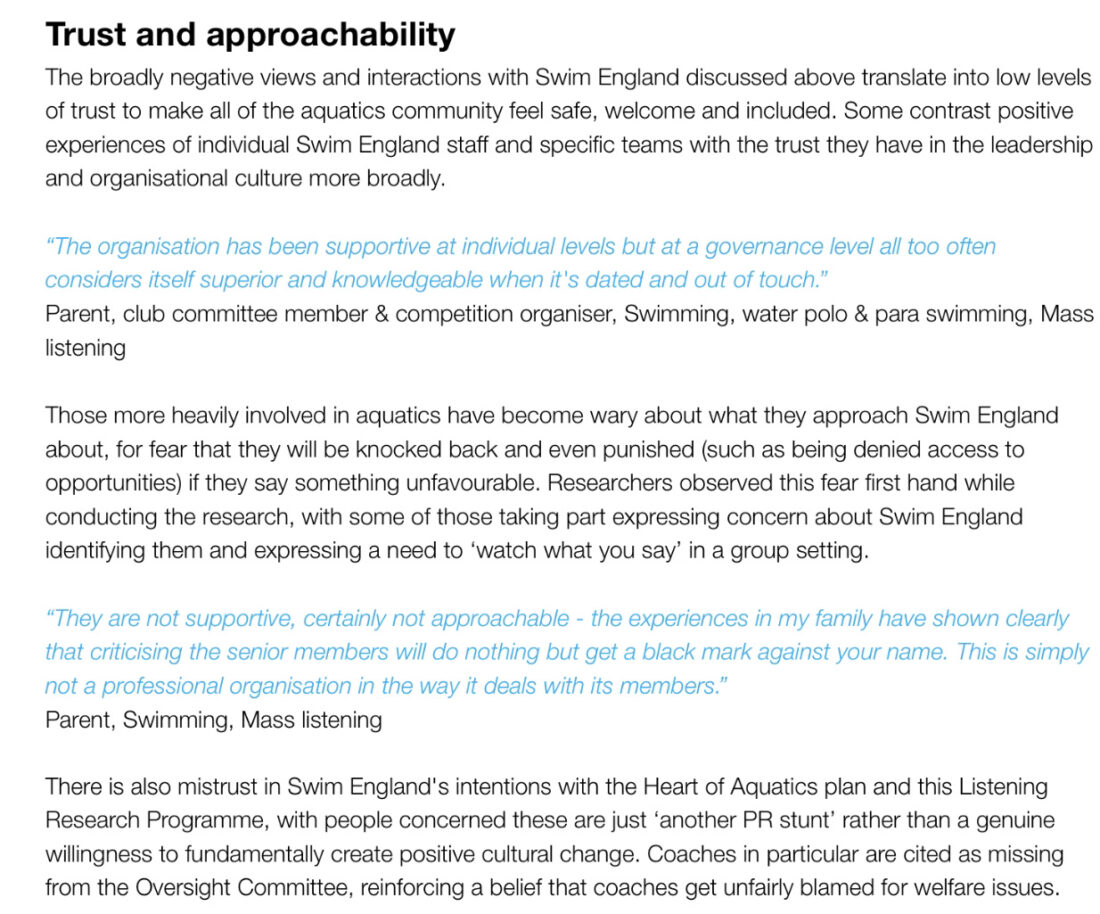
“We are sorry that the culture within aquatics has fallen short of what we strive for and that this has resulted in negative experiences within our community. As part of this, we take the views expressed about Swim England within the report extremely seriously. We are committed to change.
“We have been working on our Heart of Aquatics plan for 12 months, which aims to improve safeguarding, welfare and the underpinning culture across our sports. As part of that plan, we made a firm commitment to commission an independent report to capture an honest and thorough reflection of the prevailing culture.
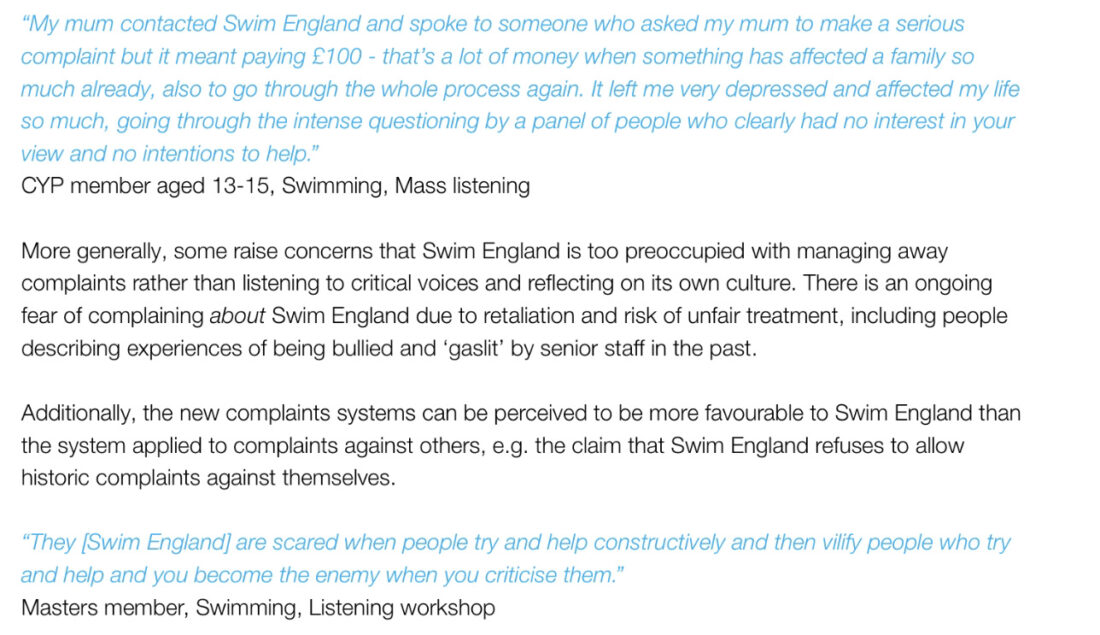
“I want to reassure everyone that we welcome the recommendations and we will act on the findings, which we fully accept. We will now take the appropriate time to develop our next steps, building on the Heart of Aquatics commitments and consulting with stakeholders as we do so. We will also continue to listen and to provide feedback on progress.
“Our overarching aim is simple – to ensure everyone feels safe, included and welcome in our sports.”
Swim England is yet to address calls from those who took part in the listening exercise for the board to resign.
‘Put Coaches On Heart of Aquatics Oversight Committee’
Coaches, not governors, are often the people in the headlines when safeguarding concerns are raised. But some of those coaches are also among those who find themselves wrongly accused but without a professional, independent judicial process to rely on.
Several key disputes in recent years have ended up with Swim England in the red corner, coaches in the blue corner, safeguarding officers on the ropes and some senior officials accused of talking to alleged victims and others related to complaints when they ought to have been a million miles away.
While some coaches of good reputation have found themselves barred for years over what many would regard as minor infractions of practice codes others have been hung out to dry by being placed on indefinite suspension for one, two and even longer without any access tthat might have been better resolved in the type of professional and independent judicial framework and process recommended by Louis Weston, the barrister behind the Weston Review.
Requests for independent review by Sport England on the strength of the Weston Review have so far been rejected by the funding body that holds the ultimate power over Swim England: it can withhold funding pending the kinds of changes now recommended by two independent reports (Weston commission by Sports England, TBA by Swim England as part of its Listening project).
In that context, one line in the report recommendations stands out:
“Include coach representation on the Heart of Aquatics Oversight Committee.”
That line is included in a number of recommendations under the heading “Support for clubs and workforce”:
- Support administrative efficiencies for those that run clubs, e.g. integration of management systems; easy access to example documents needed for compliance.
- Identify ways to give clubs more advance notice of events and changes to regulatory requirements.
- Consult more with a range of clubs to identify support needs and show empathy when communicating to them.
- Ensure the new Coaching Plan addresses vulnerability linked to the risk of allegations and financial/job security risks.
The latter sits at the core of complaints lodged with Sport England highlighting what athletes, parents and coaches describe as the harm they have suffered at the very hands of governors and guardians.
In other words, ‘… complaints against Swim England itself‘
Another Lifeline For The campaign to Reinstate the Ellesmere Titans
The lifetime in the second independent report to back The Titans’ request (among other cases that chart similarly choppy seas) to Sport England to have their complaints against Swim England investigated by independent review is cast in the conclusion and recommendations:
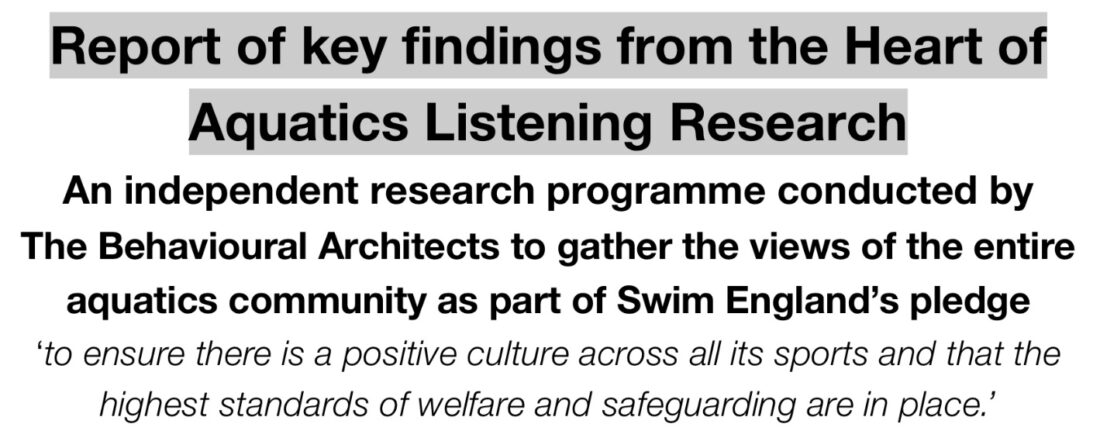
“Provide an avenue independent of Swim England for raising safeguarding concerns and complaints, particularly past and present complaints against Swim England itself, ensuring those who have not come forward can still do so and harmful behaviours are followed up where relevant.”
Among recommendations in the Report of key findings from the Heart of Aquatics Listening Research, by The Behavioural Architects
Alan Bircher, who was suspended and stripped of his head coach role any the helm of TeamGB’s Open Water squad for the Tokyo 2020ne Olympics, spent two years in limbo and unable to work in sport for more than two years with his reputation in tatters and without access to the kind of due process urged by Weston. The allegations against him were never made public and in the mix, the entire Titans program was disaffiliated over ‘safeguarding concerns’.
More than 50 families and their young swimmers, some of them alone Britain’s brightest prospects in the pool, were told they had to affiliate with other clubs if they wanted to compete in England. The fallout from that process caused immense harm to the swimmers, their parents and coaches, some of whom ended up in treatment for mental-health breakdowns.
Late last year, Bircher, former Olympian and International for Great Britain, was quietly exonerated. He’s quiet no more:
One of the key criticisms of Bircher, The Titans campaigners and others has been “selective feeding” of information to specific media described as favourable to Swim England’s leadership:
Among the highly significant issues that Swim England governors have been asked to resign over are the following references from the report:
Views on Swim England
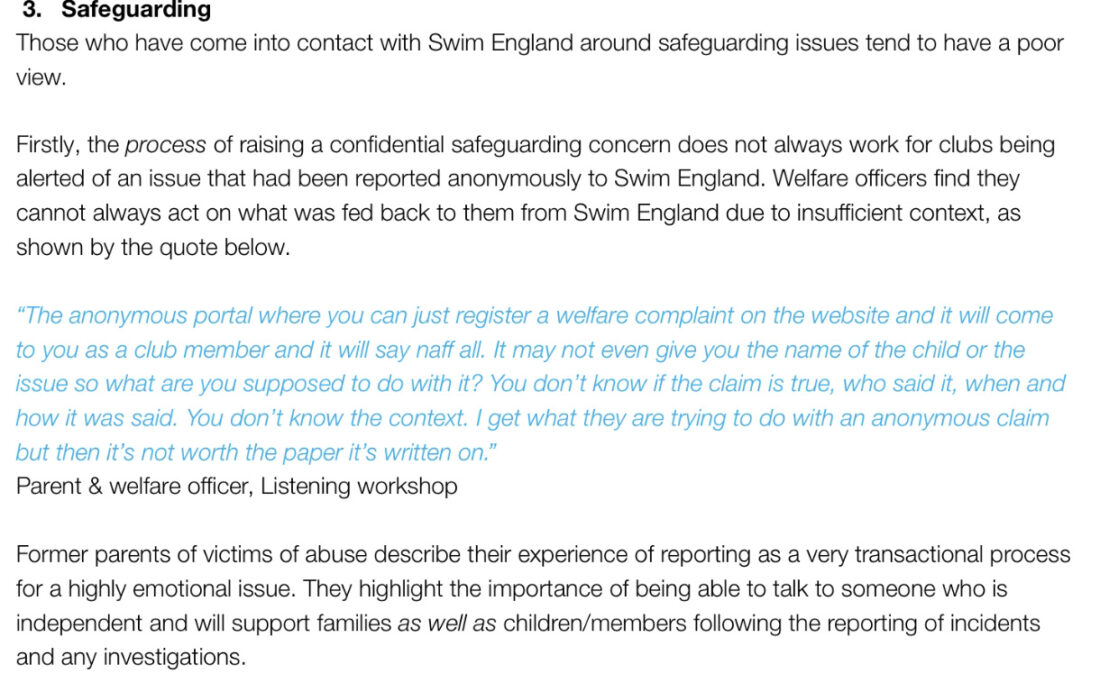
- Setting the culture: Many of the more problematic features of the aquatics culture are believed to flow top down from Swim England itself; in particular, a belief that too much attention and funding is directed towards high performance athletes to the detriment of other members. The smaller disciplines such as para swimming and Masters swimmers feel there is a lack of respect and insufficient resources for their areas of the sport, (relative to swimming), preventing growth and greater inclusion. Swim England’s culture is perceived to be insular and not open to feedback or challenge if criticism about Swim England or its staff is voiced…
- Complaints handling: Concerns about the complaints process remain for those with first hand experience, including the judicial process lacking empathy and mistrust in Swim England’s intentions and impartiality. Some have an ongoing fear of complaining about Swim England due to a perceived risk of retaliation, based on past experiences.
- Trust and approachability: Swim England is not well trusted or viewed as approachable due to a fear of potential backlash for saying something unfavourable. This extends to mistrust in the Heart of Aquatics plan and this Listening Research Programme, particularly among coaches whose voice is felt to be notably missing from the Heart of Aquatics Oversight Committee.
The comprehensive report also includes the following in its Recommendations:
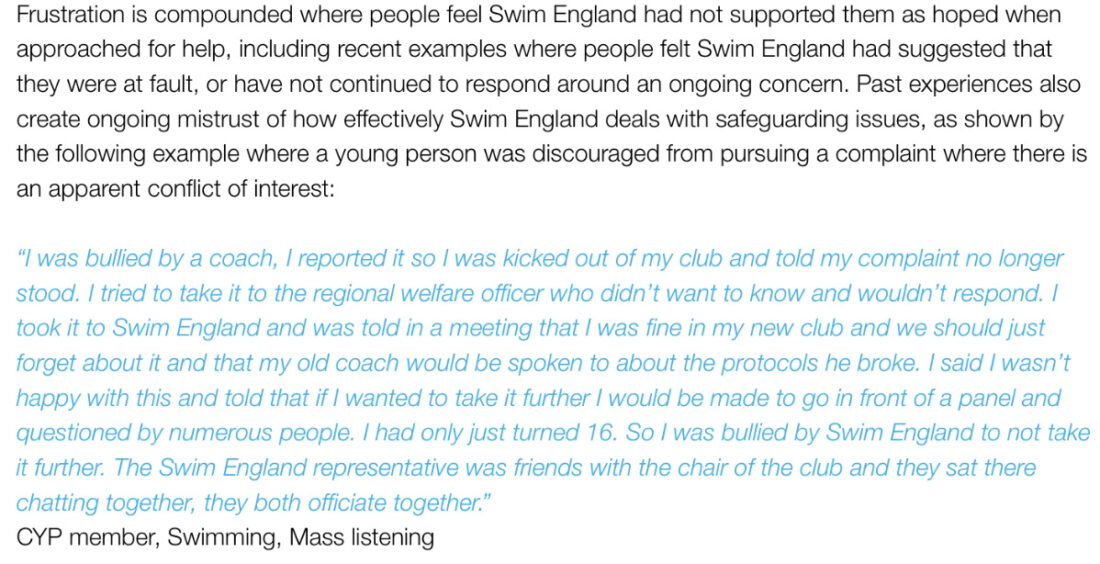
- Provide an avenue independent of Swim England for raising safeguarding concerns and complaints, particularly past and present complaints against Swim England itself, ensuring those who have not come forward can still do so and harmful behaviours are followed up where relevant.
- Conduct further focused research on user experiences of the new safeguarding and complaints processes to identify whether they are fit for purpose. In particular understand if/how clubs act on anonymised feedback, if there are sufficient levels of emotional support and overall ease of use of the process.
- Appoint an independent expert to review patterns in safeguarding reports and complaints to ensure there is a clear feedback loop and that any feedback is acted upon in a timely manner.
- Review the current system of welfare officers, in particular risks associated with conflicts of interest.
a. As part of this, Swim England might consider facilitating access to welfare officers from a different club, paid professional welfare officers, and how Sport England’s new National Network of Sport Welfare Officers can ensure impartiality. - Provide clearer guidance and protocols for managing particular types of welfare issues, e.g. clear pathways for managing eating disorders or self-harm.
- Ensure access to responsive support for welfare officers themselves when needed.
- Develop and share good practice interventions to proactively and preventatively mitigate the specific welfare risks highlighted in this report. For example,
a. Promote body positivity, body diversity and healthy eating.
b. Provide information and support around puberty in relation to performance, with the aim of reducing pressure on young people at an already vulnerable time of life.
c. Give guidance for coaches on how to communicate selection decisions sensitively.
d. Create clearer guidelines and protocols for managing conflicts of interest, e.g. conflicts of interest declarations when resolving complaints or making decisions.
e. Provide explicit permission and support to take breaks or train less intensively, e.g. pathways for re-starting. - Seek to rebalance attention and investment away from high performance junior athletes in favour of other groups within the sport. In doing so, Swim England should consider:
a. Ways to increase opportunities for lower level athletes to train/compete in a club setting, e.g. amalgamating clubs or incentives for more clubs to cater for a range of levels; lower level competitions.
b. Structural changes needed to grow Masters swimming and improve experiences, e.g. separation from the Swimming Leadership Group. - Identify ways to bring in new voices. As part of this, Swim England should consider :
a. Reviewing recruitment strategies and criteria to ensure good representation of staff who do not have an existing connection to elite sport, including at Board/SLT level.
b. Driving youth engagement and youth voice strategies.
Sport England: Funding On The Line
During the listening exercise, 19 safeguarding incidents were reported to Swim England but none of those include the programs, coaches, parents and swimmers who were already battling with what they describe as “overzealous, unfair, unprofessional and inappropriate” handling of matters by the regulator. Sport England is aware of at least some of those cases.
The funding body said the TBA conclusions were “stark … and represented a crossroads moment both for Swim England and everyone involved in the sport more widely”. Swim England’s funding is on the line, dependent on delivering the changes that both Weston and TBA have now recommended.
Among other matters highlighted in the report:
- an “urgent need” to tackle racism within swimming, with many from ethnically diverse communities feeling like they did not belong in what was viewed as a “white, middle class sport”.
- Para swimmers and swimmers with special needs said they often felt overlooked and less valued than able-bodied swimmers